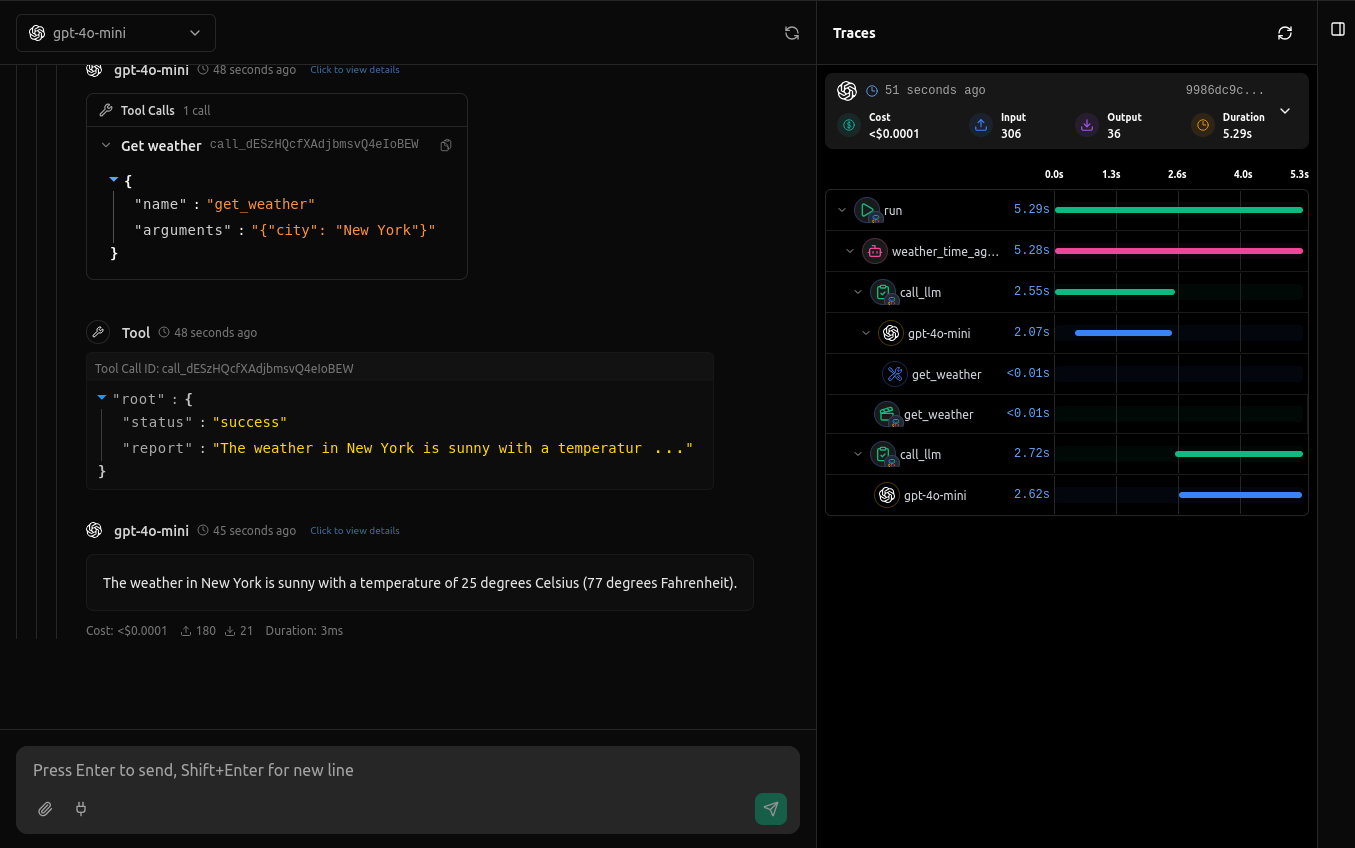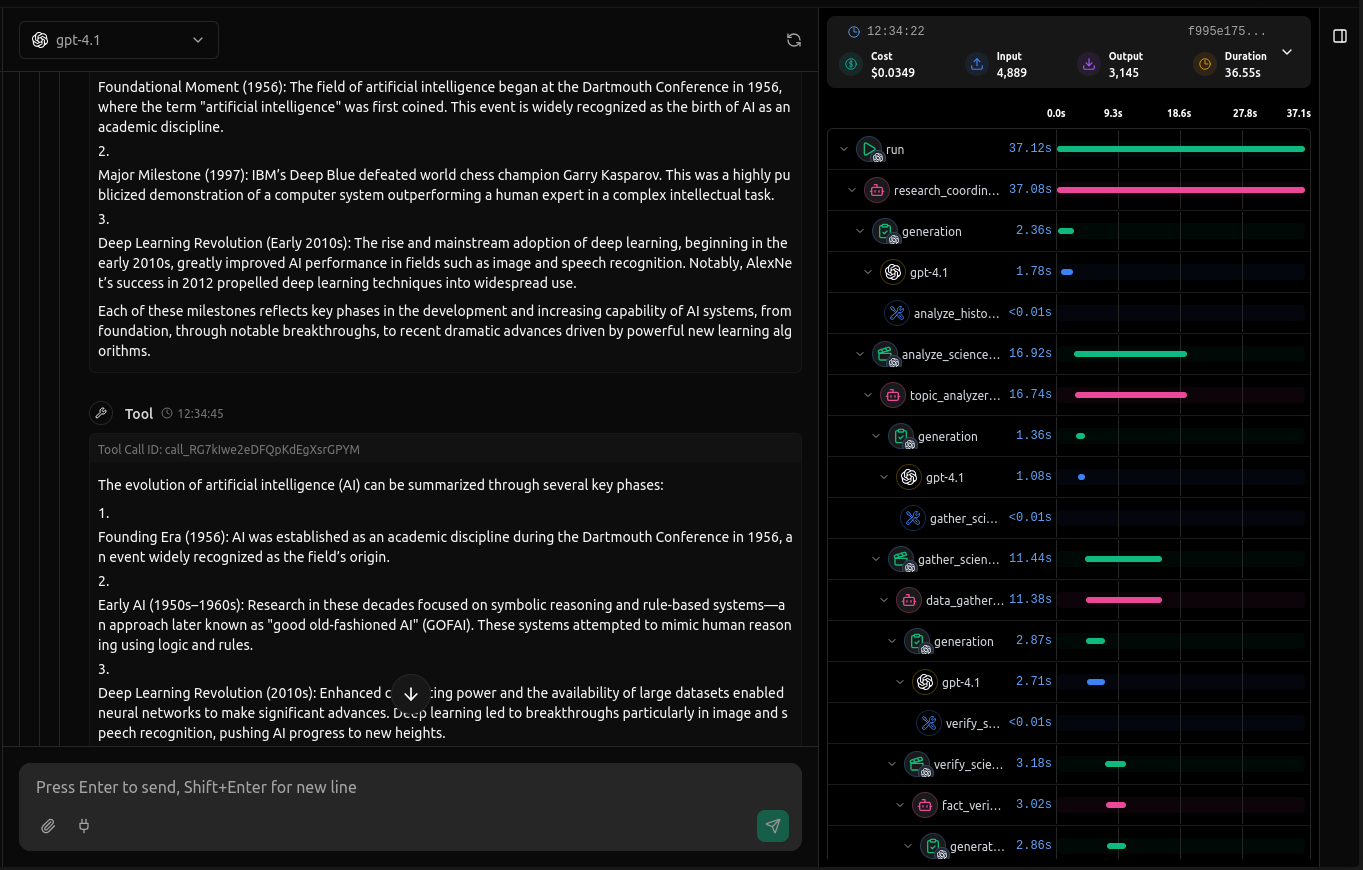This Python package is an extension of vLLora — a lightweight, real-time debugging platform for AI agents. This package adds extra tracing and observability to your agent frameworks. It captures detailed framework-level metadata — decisions, latency, and cost — and sends it to your vLLora Gateway instance, giving you a complete picture of how your agents operate across LangChain, OpenAI Agents, Google ADK, CrewAI, and more.
pip install vllora[adk]# Import and initialize vLLora tracing
# First initialize vLLora before defining any agents
from vllora.adk import init
init()
import datetime
from zoneinfo import ZoneInfo
from google.adk.agents import Agent
def get_weather(city: str) -> dict:
if city.lower() != "new york":
return {"status": "error", "error_message": f"Weather information for '{city}' is not available."}
return {"status": "success", "report": "The weather in New York is sunny with a temperature of 25 degrees Celsius (77 degrees Fahrenheit)."}
def get_current_time(city: str) -> dict:
if city.lower() != "new york":
return {"status": "error", "error_message": f"Sorry, I don't have timezone information for {city}."}
tz = ZoneInfo("America/New_York")
now = datetime.datetime.now(tz)
return {"status": "success", "report": f'The current time in {city} is {now.strftime("%Y-%m-%d %H:%M:%S %Z%z")}'}
root_agent = Agent(
name="weather_time_agent",
model="gemini-2.0-flash",
description=("Agent to answer questions about the time and weather in a city." ),
instruction=("You are a helpful agent who can answer user questions about the time and weather in a city."),
tools=[get_weather, get_current_time],
)When you call vllora.openai.init(), the OpenAI client is automatically configured to use your vLLora gateway by setting the client's base_url to the value of VLLORA_API_BASE_URL.
pip install vllora[openai]# Import and initialize vLLora tracing
from vllora.openai import init
init()
# Import agent components after initializing tracing
from agents import Agent, Runner, set_default_openai_client, RunConfig
from openai import AsyncOpenAI
import os
# Configure OpenAI client
client = AsyncOpenAI(
api_key="no_key",
base_url=os.environ.get("VLLORA_API_BASE_URL"),
)
set_default_openai_client(client)
agent = Agent(
name="Math Tutor",
model="gpt-4",
instruction="You are a math tutor who can help students with their math homework.",
)
# Your agent will be automatically traced by vLLora
response = await Runner.run(agent, input="Hello World")Note: Always initialize vLLora before importing any framework-specific classes to ensure proper instrumentation.
| Framework | Installation | Import Pattern | Status |
|---|---|---|---|
| Google ADK | pip install vllora[adk] |
from vllora.adk import init |
✅ Supported |
| OpenAI Agents | pip install vllora[openai] |
from vllora.openai import init |
✅ Supported |
| LangChain | pip install vllora[langchain] |
from vllora.langchain import init |
🚧 Coming Soon |
| CrewAI | pip install vllora[crewai] |
from vllora.crewai import init |
🚧 Coming Soon |
| Agno | pip install vllora[agno] |
from vllora.agno import init |
🚧 Coming Soon |
vLLora uses intelligent monkey patching to instrument your AI frameworks at runtime:
👉 Click to see technical details for each framework
- Patches
Agent.__init__to inject callbacks - Tracks agent hierarchies and tool usage
- Maintains thread context across invocations
- Enriches spans with agent metadata
- Intercepts agent execution via OpenInference instrumentation
- Tracks agent runs and LLM calls
- Propagates trace context through agent interactions
- Correlates spans across agent hierarchies
# Install core vLLora package
pip install vllora
# For specific framework tracing - install framework extras
pip install vllora[adk] # Google ADK tracing
pip install vllora[openai] # OpenAI Agents tracing
# Install all supported frameworks
pip install vllora[all]Set your configuration (optional credentials can be passed directly to the init() function):
export VLLORA_API_BASE_URL="http://localhost:9090"| Variable | Description | Default |
|---|---|---|
VLLORA_API_BASE_URL |
Your vLLora gateway URL; used by vllora.openai.init() to set the OpenAI client's base_url |
Required |
VLLORA_API_KEY |
Your vLLora API key. Optional for OpenAI routing (falls back to "no_key"), but required if your gateway enforces auth or when using vllora.adk.vllora_llm. |
Optional |
VLLORA_TRACING |
Enable/disable tracing | true |
VLLORA_TRACING_EXPORTERS |
Comma-separated list of exporters | otlp |
Each framework has a simple init() function that handles all necessary setup:
vllora.adk.init(): Patches Google ADK Agent class with vLLora callbacksvllora.openai.init(): Initializes OpenAI Agents tracing and sets OpenAI clientbase_urlfromVLLORA_API_BASE_URL
All init functions accept optional parameters for custom configuration (collector_endpoint, api_key, project_id)
- Missing Configuration: Ensure
VLLORA_API_BASE_URLis set to your vLLora instance - Tracing Not Working: Check that initialization functions are called before creating agents
- Framework Conflicts: Initialize vLLora integration before other instrumentation
Enable console output for debugging:
export VLLORA_TRACING_EXPORTERS="otlp,console"Disable tracing entirely:
export VLLORA_TRACING="false"- Clone the repository
- Create a
.envfile with your configuration:
VLLORA_API_BASE_URL="http://localhost:9090"
VLLORA_API_KEY="no_api_key"poetry build
poetry publish- Python >= 3.10
- Framework-specific dependencies (installed automatically)
- OpenTelemetry libraries (installed automatically)
This project is licensed under the MIT License - see the LICENSE file for details.
- GitHub Issues: Report bugs and feature requests
- Documentation: vLLora Documentation


